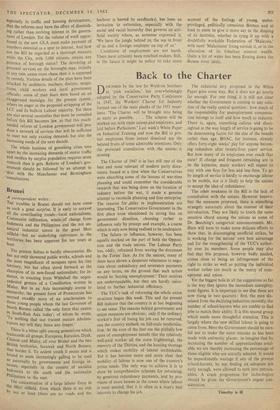Back to the Charter
DESCRIBED by the late Sir Waldron Smithers as 'pink socialism,' but overwhelmingly adopted by the Conservative Party Conference in 1947, the Workers' Charter for Industry formed one of the main planks of the 1951 mani- festo. 'The Charter will be brought into being as early as possible. . . . The scheme will be worked out with trade unions and employers, and laid before Parliament.' Last week's White Paper on Industrial Training and now the Bill to pro- tect employees from instant dismissal are the belated fruits of some admirable intentions. Only the promised consultation with the unions is missing.
The Charter of 1947 is in fact still one of the best and most relevant of modern party docu- ments. Issued at a time when the Conservatives were absorbing some of the lessons of war-time planning and could remember the considerable research that was being done on the location of industry before the war, it made a genuine attempt to reconcile planning and free enterprise. The reasons for ...delay in implementation are interesting. The Conservative Government in the first place soon abandoned its strong line on government direction, choosing rather to influence only by precept and example, a course which is only now being realised to be inadequate.
The failure to influence, however, has been equally marked on the part of both the Opposi- tion and the trade unions. The Labour Party has, oddly, refrained from waving the document in the Tories' face. As for the unions, many of them have shown a desperate reluctance to nego- tiate about redundancy and severance payments on any terms, on the ground that such action would be 'buying unemployment.' Their motives are understandable, but they are hardly calcu- lated to further industrial efficiency.
The TUC's task of reforming the whole union structure began this week. This and the present Bill indicate that the country is at last beginning to see sense. The reasons behind government and union measures are obvious: only if the ordinary worker's fear of losing his job can be removed, can the country embark on full-scale modernisa- tion. At the root of the fear are the pitifully low rates of unemployment benefit (for the relatively well-paid worker all the more frightening), the memory of the Thirties, and the housing shortage which makes mobility of labour unthinkable. Yet it has become more and more clear that mobility of labour is now one of the country's prime needs. The only way to achieve it is to show by comprehensive schemes for retraining, by generous redundancy payments, and by pro- vision of more houses in the towns where labour is most needed, that it is often in .a man's best interests to change his job. The industrial levy proposed in the White Paper goes some way. But it does not go nearly far enough. For one thing, it is still not clear whether the Government is coming to any solu- tion of the really central question: how much of the responsibility for unemployment compensa- tion belongs to itself and how much to industry. There is, again, something Callous and short- sighted in the way length of service is going to be the determining factor for the size of the benefit rather than age. BOAC, for instance, already offers forty-eight weeks' pay for anyone becom- ing redundant after twenty-four years' service. But how many of its employees ever reach that state? If change and frequent retraining are to be the keynotes, many workers will expect to stay with one firm for less and less time. To go by length of service is hardly to encourage labour to be mobile, nor is it likely to help the unions to accept the idea of redundancy.
The other weakness in the Bill is the lack of consultation with the unions. However benevo- lent the measures proposed, there is something strangely autocratic about the manner of their introduction. They are likely to touch the same sensitive chord among the unions as some of Dr. Beeching's categorical announcements. Mr. Hare will have to make some delicate efforts to show that, in discouraging unofficial strikes, he is working for the unions' own best advantage and for the strengthening of the TUC's author- ity over its members. Some people may also feel that this proposal, however badly needed, comes close to being an infringement of the right to strike as well as putting the individual worker rather too much at the mercy of man- agement and union.
Yet the biggest hole in all the suggestions so far is the way they ignore the immediate unemploy- ment figures. It is important to see that these are now rising in two quarters: first, the men dis- missed from the declining industries; secondly, the number of school-leavers who are unable to find jobs to match their ability. It is this second group which needs more thoughtful attention. This is largely where the new skilled labour is going to come from. Here the Government should be care- ful not to make the same mistake as has been made with university places: to imagine that by increasing the number of apprenticeships avail- able we are thereby increasing the percentage of those eligible who are actually selected. It would be unpardonable wastage if any of the present school-leavers, by not finding an adequate job early enough, were allowed to turn into untrain- ables. A crash programme for technologists should be given the Government's urgent con- sideration.
Timothy is ill


































 Previous page
Previous page